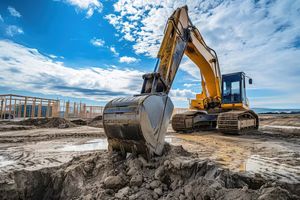
Discover Excavator Machines: Facts, Details, and Insights for Construction Projects
Excavators are one of the most necessary types of heavy equipment used in production and infrastructure projects. They are large, versatile machines, designed to dig, lift and move the soil, stone and other materials. A boom, equipped with a dip and bucket, excavation is indispensable in road construction, mining, landscape architecture and demolition.
Excavation production and infrastructure are one of the most necessary types of heavy equipment used in projects. They are large, versatile machines, designed to dig, lift and move soil, stone and other materials. A dip, a dip and bucket equipped with bucket, excavation of road construction, mining, landscape architecture and demolition are indispensable.
The concept of excavation is from the early 1800s mechanical spades, but modern excavators have evolved with advanced hydrolics, electric power and smart control. Today, they are present in different sizes, ranging from compact mining operations used in urban projects to large Caler excavations working in mining.

Meaning: Why does digest today mean
Excavations play an important role in the design of modern infrastructure. Their meaning lies in their versatility, efficiency and the ability to handle the tasks that will take weeks if they are done manually manually.
Who it affects:
-
Construction companies rely on excavation to complete projects on time.
-
Governments and municipalities use them for infrastructure development.
-
Workers benefit from low manual labor and better security.
-
Societies distribute indirectly through rapid construction of homes, roads and tool
Problems Solve:
-
Boom excavation and construction work.
-
Labor reduces costs and dangers at the workplace.
-
Hands over heavy functions such as breaking rocks or rapid buildings.
In industries such as mining and pipeline installation, excavations are not only useful—they are crucial for financial progress.
Recently Updated: Trend in Excavation Technology (2024–2025)
The excavation industry is constantly evolving with innovations that improve performance, stability and operator comfort. The new update includes:
-
Electric and hybrid excavation (2024): Many manufacturers, such as Volvo and larvae, are introduced in electrical models to reduce emissions and meet the stability goals.
-
Smart excavation with automation: Advanced models have accurate excavations, fuel monitoring and GPS, sensors and telematics to reduce the passive time.
-
Mini and compact excavation: Increasing demand for urban projects has increased the popularity of small machines that are effective in limited places.
-
Safety-promoting advertising: 360-valley cameras, proximity sensors and automatic shutdown systems are now common.
These changes reflect global pressure on green areas and better efficiency in construction projects.
Laws or Policies: Regulations on excavator use
The use of excavators is subject to various safety and environmental laws depending on the country. Some common regulatory aspects include:
-
Operator certification and training: In many countries, such as the United States (OSHA regulations), operators should be trained and certified to safely use excavations.
-
Emissions standards: Phase V or the US in EU rules such as EPA-Tier 4 standards set strict limits for drainage emissions from heavy machinery.
-
Noise Control Act: Urban areas often limit the noise level for structural equipment to reduce societal effects.
-
Security of workplace: Governments must be equipped with safety facilities such as Rollover Protection System (ROP).
-
Environmental effects: Some fields use environmentally friendly hydraulic fluids and energy-efficient motors.
Compliance with these guidelines not only ensures security, but also prevents expensive legal problems for construction companies.
Tools and Resources: Helpful solutions for excavator use
Several tools, apps, and resources are available for businesses and individuals working with excavators:
Construction management apps:
-
PlanGrid – For tracking site progress and machinery use.
-
Procore – Helps in project management, including equipment scheduling.
Machine telematics systems:
-
Cat Product Link (Caterpillar) – Monitors fuel, idle time, and performance.
-
Komtrax (Komatsu) – Provides data on usage and location.
Online training platforms:
-
Courses on excavator operation and safety are available via organizations like OSHA and CITB.
Cost calculators and rental tools:
-
Websites such as Equipment Trader or BigRentz provide cost estimation and rental availability.
Manufacturer tools:
-
Brands like Hitachi, Volvo, and JCB offer online product guides and support for machine selection.
Questions about excavation machines
Q1. What are the most important excavation types?
The most common types are collar excavation, wheel digging, mini/compact excavation, dragline excavation and suction degrees. Each type is beneficial for specific features, from mining of large-Go to urban construction.
Q2. What does an excavator cost?
The cost varies depending on the size and model. The price of a compact excavation can cost around $25,000–$75,000, while large collar excavations can exceed $500,000. The price is often a more cost-calculated alternative for small projects.
Q3. What safety conditions are necessary when using excavations?
Operators should use protective equipment, follow the safety protocol to the site and ensure that the machine is regularly inspected. Larger precautions include avoiding overhead power lines and ensuring stable ground conditions.
Q4. Is electrical excavation powerful as diesel?
Electrical excavation quickly effectively and provides equal strength for small to moderate projects. However, diesel is a heavy, long-lasting work due to current battery limitations.
Q5. Can excavators be used for demolition?
Yes, many excavated hydraulic switches and scissors are equipped with compounds that make them effective for demolishing buildings and structures.
Conclusion
Excavators are original for today's construction and infrastructure scenario. They provide speed, efficiency and versatility, so projects can be met with timely and high security standards. With innovations such as electrical models and smart automation, the future of excavation looks fast and efficient.
For companies, compliance with laws and investments in modern excavation technology not only ensure the success of the project, but also long-term environment and financial benefits. For local communities, it means rapid development of infrastructure that supports daily life.










